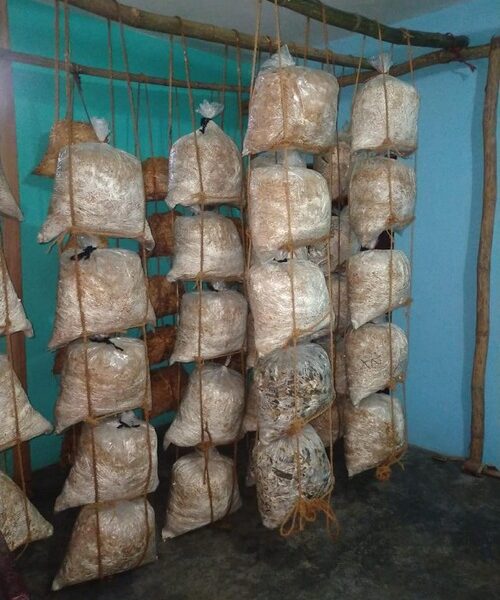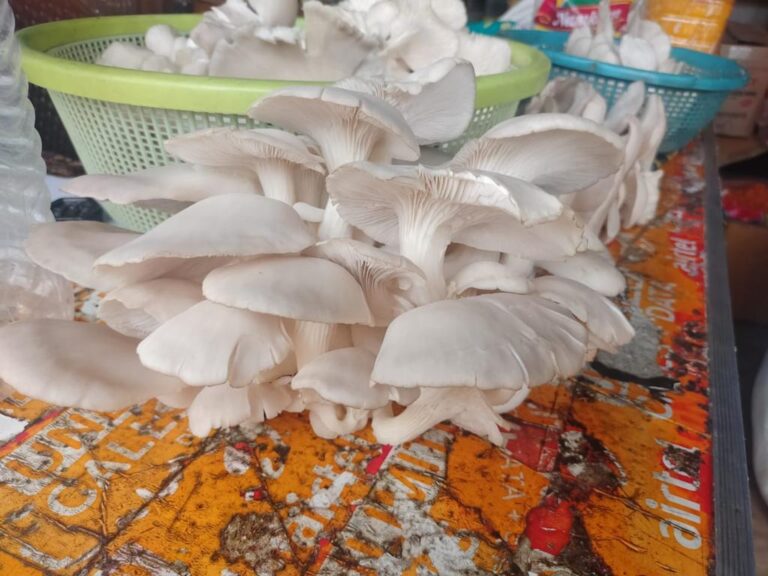
Key Benefits of Organic Mushroom Farming
- Enhanced Nutritional Value: Organic mushrooms are known to be rich in essential nutrients, making them a valuable addition to a balanced diet.
- Environmentally Friendly: This method of farming promotes soil health, reduces the need for synthetic chemicals, and minimizes the carbon footprint.
- Economic Viability: With the increasing demand for organic produce, mushroom cultivation can offer a lucrative source of income.
Getting Started: Cultivation Practices for Organic Mushrooms
Selecting the Ideal Mushroom Species (H3)
The journey of organic mushroom farming begins with the selection of the appropriate mushroom species. Factors such as climate, growing conditions, and market demand play a crucial role in this decision. Some popular choices in India include Oyster, Shiitake, and Button mushrooms.
Creating the Perfect Growth Substrate (H3)
The growth substrate serves as the nourishing bed for mushroom development. A blend of materials like compost, straw, and gypsum is prepared to provide the essential nutrients required for successful cultivation.
The Flourishing Varieties of Mushrooms in India
Oyster Mushrooms (H3)
Oyster mushrooms, scientifically known as Pleurotus spp., are a staple in Indian cuisine. These mushrooms boast a delicate flavor and a unique fan-like appearance. They thrive in a wide range of temperatures, making them a versatile choice for cultivation.
Shiitake Mushrooms (H3)
Shiitake mushrooms (Lentinula edodes) have garnered popularity not only for their rich umami taste but also for their potential health benefits. These mushrooms are often used in traditional medicine practices and are known for their immune-boosting properties.
Button Mushrooms (H3)
Button mushrooms (Agaricus bisporus) are one of the most commonly cultivated mushrooms worldwide. Their mild flavor and firm texture make them a versatile ingredient in various dishes. They require controlled environments for successful growth.

Harnessing Sustainable Practices for Mushroom Cultivation
Integrated Pest Management (H3)
Implementing integrated pest management strategies can help prevent the outbreak of pests and diseases in your mushroom farm. This approach minimizes the use of chemical pesticides, promoting a healthier and more sustainable growing environment.
Composting and Recycling (H3)
Composting not only aids in waste management but also generates nutrient-rich compost that can be used as a growth substrate. Recycling agricultural waste contributes to a closed-loop system and reduces the dependency on external resources.
The Future of Organic Mushroom Farming
As the world shifts towards more sustainable agricultural practices, the future of organic mushroom farming looks promising. With advancements in technology and a growing awareness of the benefits of organic produce, this industry is poised for further growth and innovation.
In conclusion, organic mushroom farming presents a holistic approach to cultivating nutritious and environmentally friendly crops. By embracing sustainable practices and harnessing the potential of various mushroom species, farmers can contribute to both their own prosperity and the well-being of the planet.
Remember, successful organic mushroom farming requires continuous learning, adaptability, and a deep appreciation for the wonders of nature.
The Boundless Opportunities in Organic Mushroom Farming
Organic mushroom farming is not just a cultivation practice; it’s a journey towards healthier ecosystems and prosperous livelihoods. With a plethora of mushroom varieties to choose from and a growing consumer preference for organic produce, the opportunities in this field are boundless.
Cultivating Exotic Mushrooms (H3)
Apart from the well-known varieties, there’s an emerging market for exotic and rare mushrooms. Varieties like Lion’s Mane and Reishi have gained attention for their unique flavors and potential health benefits, opening doors to niche markets.
Establishing Farm-to-Table Ventures (H3)
The farm-to-table movement is gaining momentum, and organic mushrooms can play a pivotal role in this culinary journey. Collaborating with local restaurants and markets can create a direct link between the farmer and the consumer, fostering trust and transparency.
Exploring Mycoremediation (H3)
Mushrooms have a remarkable ability to remediate contaminated environments—a process known as mycoremediation. This application presents an exciting avenue for both environmental restoration and revenue generation.
In essence, organic mushroom farming transcends the conventional boundaries of agriculture. It embraces innovation, sustainability, and a deep connection with nature.
As you embark on your organic mushroom farming venture, remember that each mushroom you cultivate is a step towards a healthier planet and a thriving community.
Start Your Organic Mushroom Journey Today
Armed with the knowledge of cultivation practices, mushroom varieties, and sustainable approaches, you’re ready to embark on your organic mushroom farming journey.
Whether you’re a seasoned farmer looking to diversify your crops or an aspiring cultivator eager to contribute to sustainable food systems, organic mushroom farming offers a rewarding and enriching experience.
Embrace the Fungi Magic: A New Chapter in Agriculture
As you delve into the realm of organic mushroom farming, you’re not just growing fungi—you’re cultivating a future where agriculture harmonizes with nature.
The earthy aroma of mushrooms, the satisfaction of nurturing life from the soil, and the smiles of satisfied consumers are all part of this magical journey.
So, roll up your sleeves, prepare your growth substrates, and embark on an adventure that promises not only bountiful harvests but also a profound sense of purpose.
In conclusion, organic mushroom farming is a blend of science, nature, and sustainable practices. It’s an invitation to contribute to a healthier planet while reaping the rewards of your dedication and care.
Remember, every mushroom tells a story—a story of growth, resilience, and the intricate dance between human ingenuity and the wisdom of the natural world.